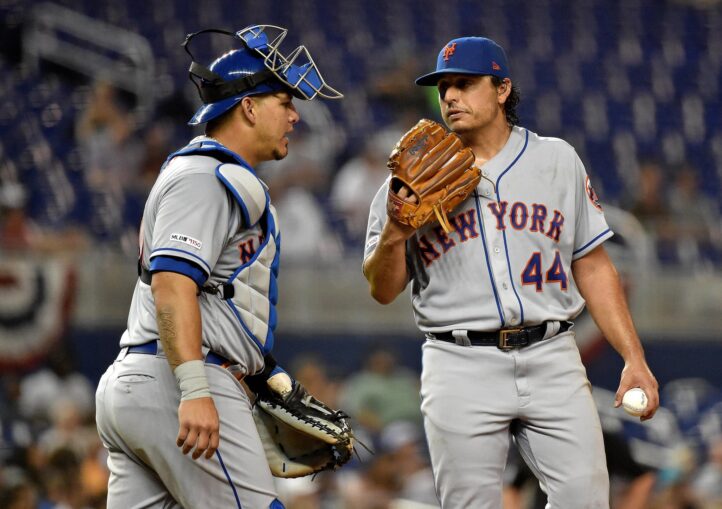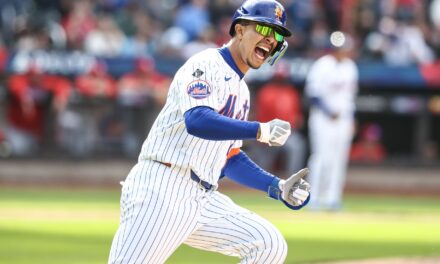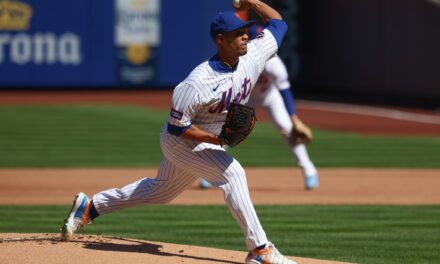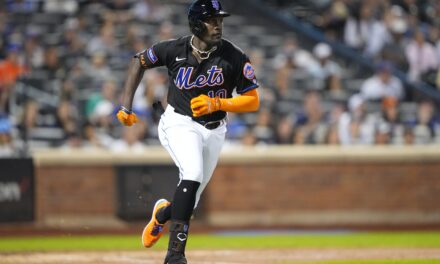
In his first appearance of the 2019 season against the Miami Marlins, Mets left-hander Jason Vargas hung around through five innings, allowing two earned runs on eight hits and a walk while striking out two en route to a 6-5 win.
Though the Fish had struggled against Vargas with just two runs and five hits in their two meetings the prior year, there were plenty of doubtful moments from Tuesday’s action that may be worth unpacking.
Blessed with a five-run lead before he even took the rubber, Vargas immediately gave one back in a span of three batters and ten pitches, as Curtis Granderson and Brian Anderson socked consecutive doubles on a flat changeup and knee-high fastball (respectively).
Though the veteran would leave the damage at that, he didn’t necessarily retire the side on confident terms. Starlin Castro launched a fastball to the warning track in right field for a loud second out, and Martin Prado took a free base on four changeups off the plate.
The inning ended following a long fly out to left field on a changeup that catcher Jorge Alfaro barely missed. All in all, Vargas threw just eight of his 18 pitches for strikes that inning, missing with the first pitch to five of the six batters faced. His control perked up the following frame, as he fooled Peter O’Brien on a changeup to win a seven-pitch at-bat while jamming shortstop Miguel Rojas into a routine grounder to second. Following a misplay from Robinson Cano to prolong the inning, Vargas put Granderson away with an equally tough two-seamer.
On the night, Vargas sat in the range of 84-86 mph with his fastball, a slight dropoff from the 86-87 average he saw in 2018. The most alarming statistical takeaway had to be the swings themselves, as Miami swung and missed at just three of the 74 pitches thrown on the night (approximately 4.1%).
“There’s always room for improvement, but I couldn’t pinpoint one thing right now for you,” Vargas told reporters after the game.
Despite shelling out just a dozen pitches in a scoreless third, the narrative wasn’t too pretty. Anderson led off with a deep flyout to right before Castro and Prado each capitalized on missed fastballs by drilling base hits to open another scoring opportunity.
Fortunately, Vargas made the important pitch to Alfaro – a pretty changeup down in the zone to induce a 6-4-3 double play. The lefty took another step forward in the fourth, as he worked around a leadoff double from Lewis Brinson with a three-pitch strikeout of O’Brien, three-pitch popout from pinch-hitter Rosell Herrera, and three-pitch groundout from Rojas.
Team skipper Mickey Callaway seemed to be in high praise of Vargas in his postgame interview, lauding the veteran’s ability to “[make] his pitches” and “[throw] the ball well,”
“That’s standard Vargas,” Callaway added.
He continued his strides into the fifth inning, recording his first two outs on just five pitches. Another miss with his fastball, however, would bring the party to an end, as his first offering to Starlin Castro wound up in the seats in left-center field. A hanging curve to Prado the following at-bat met a similarly loud fate off the wall in left, which prompted a meeting from pitching coach Dave Eiland.
Vargas missed outside with his next two fastballs to Alfaro before skating away with a 4-3 groundout on an outside changeup, but effectively left his 74-pitch outing not too differently from the way he entered (or perhaps failed to enter). 12 of the 20 balls Miami put in play last night came off the bat with an exit velocity of at least 94 mph. It may be worth noting that – sans Granderson and Alfaro – this same lineup contributed rather handily to the fifth-highest soft-contact rate in the majors last season (19.3%).
Having checked in at the first percentile in fastball velocity last season and already on a potential hot seat given the team’s recently-maintained tabs with free agent left-hander Dallas Keuchel, Vargas will certainly need a more convincing outing in terms of length and/or control in order to remain in the organization’s plans for 2019. Five-inning starts on which the focus shifts to simply limiting collateral damage cannot be on the agenda for any starting pitcher on any competitive team.















